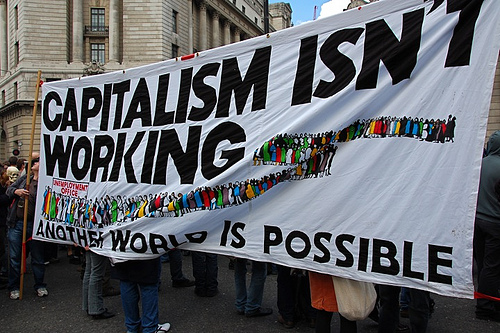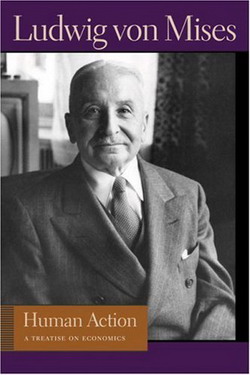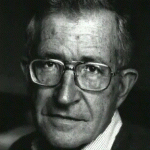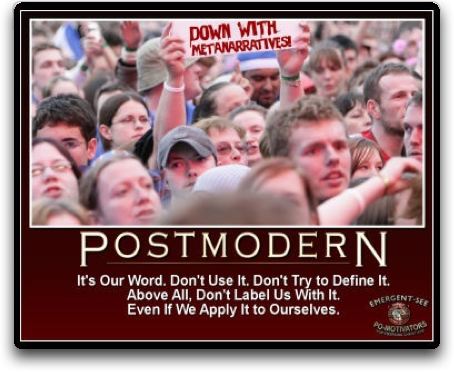 The National Socialist German Workers’ Party was founded in 1919 and abolished in 1945. It came into full power under Adolph Hitler in 1933, and proceeded at that time to slaughter a spectacular number of people in a relatively short span of years.
The National Socialist German Workers’ Party was founded in 1919 and abolished in 1945. It came into full power under Adolph Hitler in 1933, and proceeded at that time to slaughter a spectacular number of people in a relatively short span of years.
Socialists today are of course universally agreed that Nazism was many things, but socialistic was not one of them.
Indeed, socialists are most emphatic that you understand this point — and for a very good reason: Nazism exposes socialism for what it actually is: a horrific philosophy in which humans are slaves to a ruling elite.
In fact Nazism was pure socialism.
As we’ve pointed out many times before — and can never point out enough — socialism is fundamentally defined by the abolition of private property.
Private property, or private ownership, is, in the language of the law, Not only money and other tangible things of value, but also includes any intangible right considered as a source or element of income or wealth. The right and interest which a man has in lands and chattels to the exclusion of others. It is the right to enjoy and to dispose of certain things in the most absolute manner as he pleases, provided he makes no use of them prohibited by law. [Property] is a claim by a person or persons to exclusive utilization, consumption, or transfer of some category of goods. The right of property is the right to use and discard (Lectric Law Library).
It was by means of the Food Estate guild, the Estate of Trade and Industry guild, and the Labor Front guild that the Nazis were able to take control of every group of producer and consumer in Germany.
German socialism, so-called, assumed complete control of the means of production, while maintaining the facade of a market economy. The crucial point here, however, which one must never overlook, is the fact that prices and wages were all ‘fixed by the central authority.’ Thus, they were only ostensibly prices and wages — meaning: in actual fact, prices and wages were determined by order of the socialist German government, not the free-market. In this way, Nazism masqueraded as a system of free-enterprise, but in reality it was socialist up to its gills.
The difference between National Socialism (Nazism) and communistic socialism is purely a question of form: the Nazis, unlike the Marxists, did not advocate public or governmental ownership of the means of production. Nazism, rather, openly demanded that government oversee and regulate the nation’s economy. The issue of ‘legal’ ownership, explained Adolph Hitler, is secondary; what counts is the issue of control.
“Under Nazism, citizens retain the responsibilities of owning property, without freedom to act and without any of the advantages of ownership. Under Marxist socialism, government officials acquire all the advantages of ownership, without any of the responsibilities, since they do not hold title to the property, but merely the right to use it — at least until the next purge” (George ReismanCapitalism).
Both are variations on the same theme, and that theme is collectivism.
Collectivism is the political theory which believes that “the collective” has primacy over the individual.
“The collective” refers to “the society” “the group” “the gang” “the tribe” “the proletariat” “the superior race” “the environment” “the common good” “labor” and many other things as well. The specifics do not matter because the principles are the same.
What really matters is that the individual is subordinate to the named collective.
This system of de facto socialism, carried out under the outward guise and appearance of capitalism, in which the legal forms of private ownership are maintained, has been aptly characterized by Ludwig von Mises as socialism on the German pattern. The Germans under Ludendorf and Hindenburg in World War I, and later under Hitler, were the foremost practitioners of this type of socialism. (The more familiar variant of socialism, in which government openly nationalizes the means of production and establishes socialism de jure as well as de facto, von Mises calls socialism on the Russian or Bolshevik pattern.)
It cannot be emphasized too strongly that Nazi Germany was a socialist country and that the Nazis were right to call themselves National Socialists. This is something everyone should know; yet it appears to have been overlooked or ignored by practically all writers but von Mises and Hayek.
In Nazi Germany, the government controlled all prices and wages and determined what each firm was to produce, in what quantity, by what methods, and to whom it was to turn over its products. There was no fundamental difference between the Nazis and other socialists (ibid).
“Basically, National Socialism and Marxism are the same,” said Adolph Hitler.
“Profit is the source of all evils,” said Goebbles, whose hatred of laissez faire was stupendous.
“We believe that the scourge of pollution, depletion of resources and degradation of our natural environment is primarily the result of the reckless policies of profit-driven laissez-faire capitalism,” says a present-day environmental group called Socialist Action, who also add:
“We believe that under socialism – through a rational, democratically controlled planned economy – we will be able to make decisions that can stop and reverse the destruction of the environment.”
The following is from a present-day environmentalist named Roger Field:
“In fact, there are a number of environmentalisms in this country: wilderness preservation, animal rights and the like. But it is in the rich, class-based struggle to control the excesses of unrestrained industrialism where environmentalism and socialism can most easily be seen to meet.”
From Canada dot com:
“Saving the planet, like fighting wealth and privilege, is a moral proposition. It supersedes factual argument…. Environmentalism is neither religion [wrong!] nor science. It is a political mission, every bit as unquestioning as socialism in its heyday, and offering the same giddy promise to followers: The delicious prospect of being in the right, and better still, running things.”
“Each activity and each need of the individual will thereby be regulated by the party as the representative of the general good. There will be no license, no free space, in which the individual belongs to himself. This is socialism — not such trifles as the private possession of the means of production. Of what importance is that if I range men firmly within a discipline they cannot escape? Let them then own land or factories as much as they please. The decisive factor is that the State, through the party, is supreme over them, regardless whether they are owners or workers. All that, you see, is unessential. Our socialism goes far deeper,” said Adolph Hitler.
“Individual rights will have to take a back seat to the collective,” says Harvey Ruvin, of the International Council for Local Environmental Initiatives, in Dade County Florida.
From a book by the Sierra Club, entitled Call to Action, Handbook for Ecology, Peace and Justice: “The political and economic system that destroys the Earth is the same system that exploits workers” – i.e. laissez-faire capitalism.
The head of the 1992 Earth Summit asks in all seriousness: “Isn’t the only hope for the planet that the industrialized civilizations collapse? Isn’t it our responsibility to bring that about?”
“The state of mind, which subordinates the interests of the ego to the conservation of the community, is really the first premise for every truly human culture. This basic attitude from which such activity arises, we call — to distinguish it from egoism and selflessness — idealism. By this we understand only the individual’s capacity to make sacrifices for the community, for his fellow men.”
Said Adolph Hitler.
 Regarding the Wall Street protests, Robert Robb, a columnist for the Arizona Republic, has a recent and fairly interesting article. Here’s an excerpt:
Regarding the Wall Street protests, Robert Robb, a columnist for the Arizona Republic, has a recent and fairly interesting article. Here’s an excerpt: 




